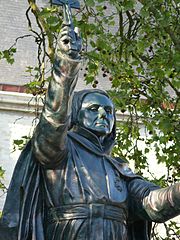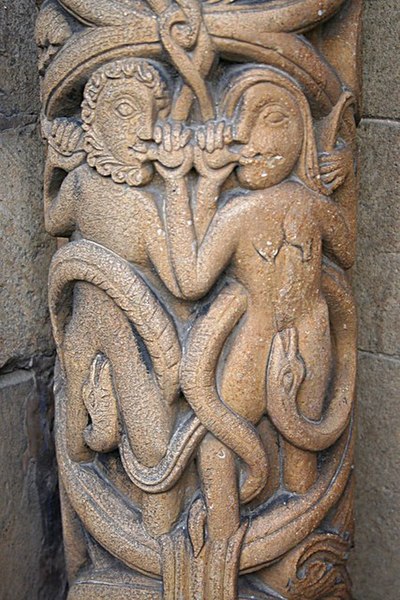Lenten Sunday 2 A (16 Mar 2014)
Homily of Fr. Paul Panaretos, S.J.
Early in my priesthood I made my annual retreat. After arriving I told my director I had come more than to pray. I desired the Trinity reveal to me what I needed for my life. The Trinity enlightened me: prayer is far more than words and time for them. Prayer is relationship with our triune God.
_-_James_Tissot_-_overall.jpg) The pivotal moment on that retreat happened the day I spent visiting and revisiting the Transfiguration. Its operative grace was light: Like the sun…[Jesus] shone. Jesus wrapped me in his light. As sunlight represents life, Jesus invited me to receive his life and to welcome it, accept and share it.
The pivotal moment on that retreat happened the day I spent visiting and revisiting the Transfiguration. Its operative grace was light: Like the sun…[Jesus] shone. Jesus wrapped me in his light. As sunlight represents life, Jesus invited me to receive his life and to welcome it, accept and share it.
I am not exceptional. God in Jesus by their Spirit extend the same invitation to you and every one. A single word captures their invitation and the variety of ways they reveal it: friendship—friendship with Jesus. I have called you friends1 was no throwaway line of Jesus. Friendliness grounds the church’s mission from welcoming, reconciling, worshiping, charity, justice and proclamation. The church’s mission is the mission of each Christian. Our mission is to invite others to the same friendship revealed and offered to us.
God’s gracious friendship exceeds words. God’s gracious friendship includes this: God desires each of us and graces us with what any of us needs each moment. The Transfiguration of Jesus was such a moment for the disciples.
Before Jesus took Peter, James, and John his brother, and led them up a high mountain by themselves, Jesus had just show[n] his disciples that he must go to Jerusalem and suffer many things from the elders…ruling priests…scribes, and be killed, and on the third day be raised.2 Peter, we recall, objected severely to Jesus. Can we appreciate Peter’s feelings? We can at least begin when we recall their ancient Mediterranean culture desired honor and feared shame. Honor was the prized value of their culture.
Honor involved more than esteem and privilege. Honor involved public image and moral responsibilities. Someone could be born to honor as the child of a person of high reputation or pedigree. Or, one could be adopted to it. Adoption not only won the prized value. It oiled the political machinery: if a ruler adopted his chosen successor as his child, people recognized the successor as legitimate.
The opposite of honor was shame, and people feared it. Tarnishing image and failing to live up to responsibilities owed family, friends and clan was shameful. People feared to bring disgrace on family and clan. They also feared the humiliation those actions—even accusations—carried.
Romans knew their culture. The most shameful death they could execute was crucifixion; it was a shame-spectacle: pains inflicted; power taken self-respect lost—progressively and all in public!3 For slaves and revolutionaries to be killed was to be crucified. Peter staked his life on Jesus; he could not bear the shame of his messiah being killed. He naturally objected to what Jesus said.
Words of Jesus were not enough. So Jesus took Peter and the other two hot-tempered disciples4—his inner circle—up the mountain. We have no video of what happened. That does not mean we are left with no meaning. Mountain and God are closely associated in Israel’s tradition. Moses went up a mountain to communicate with God and receive God’s teachings. Prophets and mountains were no strangers.5 Mountain, Moses and Elijah were only three features of the gospel. Others were: heaven opened; light; a cloud; a vision; a voice; a command. The command, Listen to Jesus, included what he had just told them: he would die suffering. Do these features offer meaning?
The vision was for Peter, James and John. It validated them as prophets of Jesus’ good news. It offered them a new way to grasp honor and rely on God as its source not humans. That took time and more help from God at work in them. Jesus’ words to them, “Tell the vision to no one until the Son of Man has been raised from the dead,” are as much grace as command. They would struggle to accept Jesus’ words and his fate until they experienced Jesus risen. Then they grasped God honored him and them in an undying way.
Jesus has been raised from the dead for us. That is why we are here. Lent is time for each of us to refresh our friendship with Jesus. Its practices help us count on God in Jesus by their Spirit for all we are, all we have and all we do from our friendship. Prayer grows our friendship with Jesus.
In your daily 15 minutes with Jesus this week
- Rest in the life of our triune God.
- Ask Peter, James and John to present you to Jesus.
- Chat with him: thank him for having called you his friend. Consider the ways you resist his friendship. Talk to Jesus about them.
- Ask Jesus for grace to open more to him and his risen life he desires you to enjoy.
- Close saying slowly the Lord’s Prayer. His words on our lips remind us that Christian friendship is not conveniently seeing the same way. Christian friendship begins by learning Jesus to have his attitude; then living from it.
____________
________________________________________________________________
Wiki-images of Jesus transfigured PD-US and by S Yao of Divine Light CC BY-SA 3.0

_-_James_Tissot.jpg)
_-_James_Tissot.jpg)


_-_James_Tissot_-_overall.jpg)


_-_James_Tissot_-_overall.jpg)







_-_James_Tissot_-_overall.jpg)





.jpg)